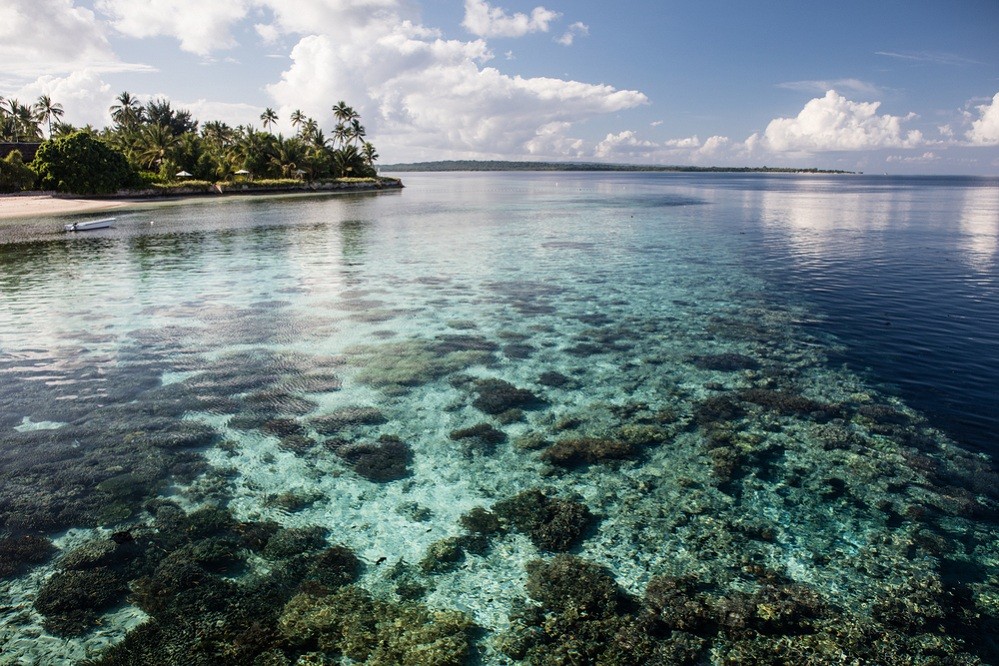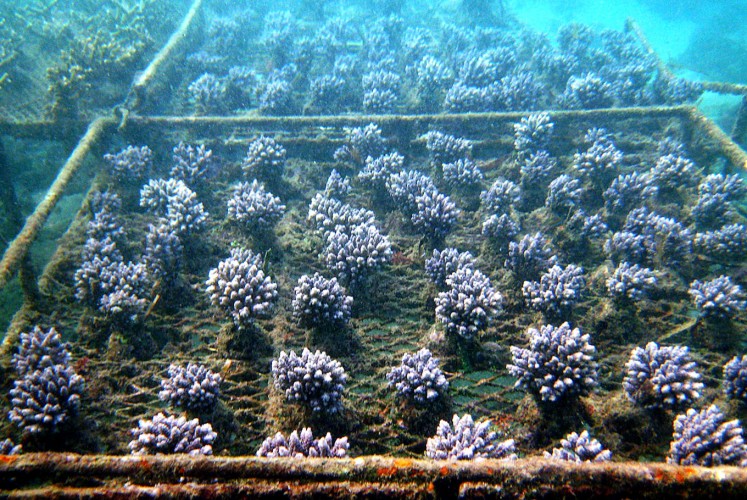Popular Reads
Top Results
Can't find what you're looking for?
View all search resultsPopular Reads
Top Results
Can't find what you're looking for?
View all search resultsCoral exports ban: Threat or opportunity for sustainability?
While coral reefs have an economic value, coastal communities have a direct incentive to preserve them as a sustainable source of income
Change text size
Gift Premium Articles
to Anyone
F
rom London to Los Angeles, ornamental fish kept in home aquariums are increasingly man’s sole connection to the jungles of the ocean known as coral reefs.
These tanks sometimes include live coral pieces as a natural marine habitat, and around 50 percent of these are sourced from the coasts of Indonesia.
In early May, the Indonesian government shocked the ornamental fish industry by shutting down all exports of coral in a sudden blanket ban.
According to the Indonesian Coral Shell and Ornamental Fish Association (AKKII) managing director, Dirga Singkarru, the decision resulted from efforts to synchronize regulations between the Environment and Forestry Ministry and the Maritime Affairs and Fisheries Ministry.
“The management authority is the environment ministry, which handles CITES [Convention on International Trade in Endangered Species] management. National regulation requires health quarantine certificates, with the body issuing these coming from the fisheries ministry, but they also want to take part in controlling and monitoring. Both of them have the instruments of the law and therefore, they’re resynchronizing to not overlap,” Dirga said.
Meanwhile, other stakeholders have expressed concerns over the ban’s potential impacts on the supply chain.
“Exporters have many employees and also many suppliers with many fishermen. I think it’s a very big problem,” said Wesen Wirawan, owner of coral export business Golden Marindo.
Separately, Ornamental Fish International (OFI) president Shane Willis said the ban would have a devastating impact on the coral trade market and industry in Indonesia.
“Within two months, this is going to have very big financial impacts on Indonesian exporters. [In] six months, it will start to really destroy the market. And [in] a year or two, it’s over. I don’t think the industry would come back from that. Everyone who buys coral from Indonesia will now go elsewhere,” Willis said.
Willis reflected broader concerns around the absence of a stated timeframe and the potential for Indonesia to lose its market share to wild or farmed coral exports from other countries.
A recent ban on coral exports based on endangered species in Fiji, as one of the world’s biggest coral exporters, had crippling effects.
The effects on retail shops in regions such as Europe that are supplied by Indonesian coral are substantial, with many importers receiving weekly shipments. Coral is a living organism and a perishable good that must move quickly along the supply chain and cannot be stored in warehouses.
David Nicholson from Independent Aquatic Imports in London, the largest aquatic livestock importer to the United Kingdom, said Indonesia was their main supplier for corals and the ban would require them to adjust their business.
“Eighty percent of the corals we bring in come from Indonesia. If that was taken away then it will affect us, but we can get coral from elsewhere. It won’t kill our industry, but it’ll make it a lot more challenging.”
Another potential knock-on effect is upon Indonesian exporters of ornamental fish and their collectors. Importers often buy coral and ornamental fish together to reduce transportation costs, with the ban on one likely causing reduced demand for the other and further drift toward other countries’ exporters.
Indonesia is one of the biggest suppliers of marine ornamental fish in the world, and an estimated 12,000 people are directly employed in its coral industry.
Perhaps the most dramatic impact would be on grassroots livelihoods in coastal communities, where ornamental fishing is a major employer. In these regions, the catching of ornamental fish provides an opportunity for local fishermen to engage in fishery management, promoting the sustainability of both their livelihoods and functioning of the local reef ecosystem.
Willis believes the ban has the potential to undermine efforts to encourage the sustainable management of coral reef use.
“A lot of people who are now employed coral farmers are actually fishermen who used to use cyanide and other destructive practices. They’re now helping the environment, but they’re prevented from doing that and have no alternatives,” Willis said.
“So will they go back to some of these destructive fishing practices? It’s possible. People are going to do what they have to do to survive.”
While coral reefs have an economic value, coastal communities have a direct incentive to preserve them as a sustainable source of income.
Efforts are underway to develop a mechanism, such as a partial ban focusing on exports of wild collected corals, while maintaining exports of farmed coral, which would allow exporters to continue trading in the interim.
Berny Achmad Subki from the Maritime Affairs and Fisheries Ministry urged everyone involved to remain optimistic and open to wide and smooth communication.
He added that the ministry believed the ban was a necessary step in improving monitoring of the trade, as part of an ongoing, nationwide assessment of sustainable natural resource use.
Longstanding concerns exist around the overexploitation of wild coral supplies, with more than 85 percent of Indonesia’s reefs at high threat from human activities. Indonesia has established quotas for harvesting and exporting live coral in 11 regions.
However, due to currently limited regulatory control and monitoring in these regions, there is a risk of overexploitation for species targeted for export. This potentially adds to stresses faced by coral reefs, such as rising sea temperatures brought on by climate change.
“If officials perform stronger monitoring, control, surveillance and enforcement coordination among authorities, the export ban would reduce direct pressures to coral reefs ecosystems, both those in marine protected areas or out of the areas,” said Ariefsyah Nasution, an oceans campaigner at Greenpeace.
Thus, the effects of longer-term resynchronization could be increased recovery for reef ecosystems.
In recent decades, advances in technology have allowed aquariums to become a more affordable hobby for an increasingly urbanized society to personally engage with aquatic life. This provides a precious link between people and the need to conserve natural wonders in our oceans.












